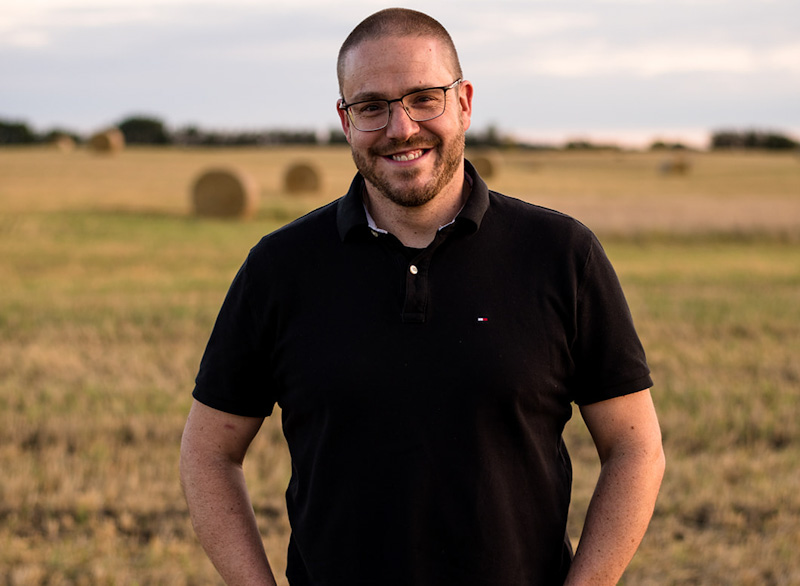Near my desk, I keep the following quote from Pope Benedict XVI: “Being Christian is not the result of an ethical choice or a lofty idea, but the encounter with an event, a person, which gives life a new horizon and a decisive direction.”
That person, of course, is Jesus, and the history of our faith is filled with people like St. Paul or St. Francis of Assisi who’ve had an encounter with Him and who, in turn, whose lives have launched into a new, decisive direction.
This was the case when Jesus asked the Apostles “Who do people say that I am?” (Mark 8:27), and they gave him a variety of answers, the same is true today. When you ask people these days who Jesus is, you’re likely to get a lot of different answers. While some wonder if Jesus might be a myth, most view him as a prophet or religious teacher. But if we’re going to take on the name of Christian – a follower of Christ – we need to be clear on who it is we believe Jesus is. The Catechism explains the mystery known as the hypostatic union:
The unique and altogether singular event of the Incarnation of the Son of God does not mean that Jesus Christ is part God and part man, nor does it imply that he is the result of a confused mixture of the divine and the human. He became truly man while remaining truly God. Jesus Christ is true God and true man. (CCC 464)
We can see that Jesus is God based on His words and actions throughout the Gospels. For example, we can look to an early miracle in the Gospel of Mark, when Jesus encounters a paralyzed man (Mark 2). Rather than simply having the man stand up and walk away (that comes later), Jesus looks at the man and says “Son, your sins are forgiven” (Mark 2:5). The Scribes get to the heart of things when they ask: “Who can forgive sins but God alone?” (Mark 2:7).
Most of us would agree that forgiveness belongs properly to the one who was wronged. I can’t forgive someone who broke into your house for that action because it has nothing to do with me. Similarly, for Jesus to walk around forgiving sins was a clear sign that he wasn’t just some upstart teacher: He was claiming a much greater role. This goes along with other things Jesus says: “Very truly, I tell you, before Abraham was, I am” (John 8:58).
Following this, the crowd picked up stones to kill Jesus because of all that was implied here. It’s a similar scene in John 10:30, when Jesus says that “The Father and I are one” – again, the crowd is ready to stone him to death.
I think we don’t always realize just how extraordinary a claim this is: that by forgiving sins Jesus was showing us that He is God. The miracles He performs throughout the Gospels are the proof that He is who He says it is. Ultimately, it is the underlying claim to be the “son of God” that gets Jesus arrested, prosecuted, tortured, and executed.
But He isn’t just God; He’s also human. This is at the center of what we celebrate at Christmas. Jesus was born and grew up just like we do, learning how to do things like walk and talk. As a child, he lived the life of a refugee, fleeing the persecutions of Herod.
Later, He apprenticed as a carpenter under the tutelage of St. Joseph and lived through the loss of His foster father at some point before he started his public ministry. In those years, He experienced many human experiences: shared friendship with His apostles, being misunderstood by others, the betrayal of a dear friend.
We see Jesus experience the range of human experiences, in the celebrations of a wedding at Cana (John 2:1-12) and later weeping at the death of his friend, Lazarus (John 11:32). When you consider all of this together, it means that Jesus has firsthand experience of our joys, sorrows, dreams, and temptations… because He has lived all of it Himself.
There is a danger that we allow the stories of Jesus in the Gospels to become familiar, and as a result we allow the faith to become all about ethical choices and lofty ideas. We need to remember that Christianity is a life-changing encounter with Jesus, whom we believe to be both God and man.
It’s for this reason that I have Pope Benedict’s quote beside my desk as a reminder of Jesus and all that we believe about Him. The Gospels remind us that Jesus is fully God. This means that His words and promises can be trusted and that we are right to follow Him. At the same time they also show us that Jesus is fully human. This means that when we pray, we are sharing our hearts with God, who having lived as one of us, knows us from the inside out. This is the heart of the life of a Christian, and everything else we do flows from here.
— Mike Landry is chaplain to Evergreen Catholic Schools west of Edmonton, and serves as an occasional guest speaker and music minister in communities across Western Canada. Mike and his wife Jennifer live in Stony Plain, Alta. with their five children.

